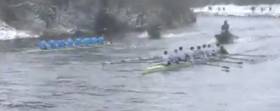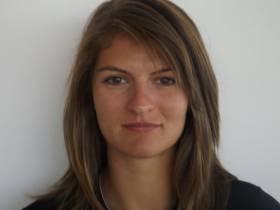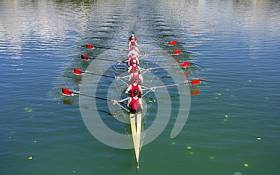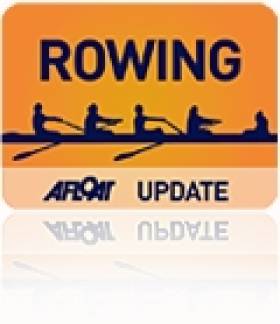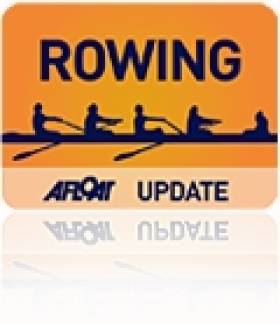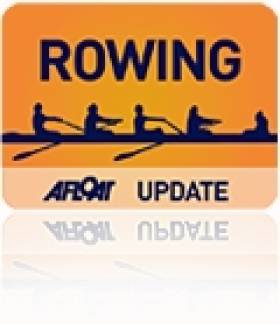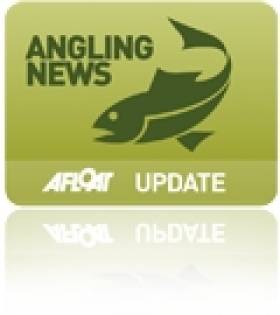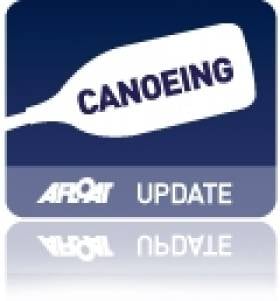Displaying items by tag: Islandbridge
Trinity Draw on Fitness to win Gannon Cup
#Rowing; Trinity won the Gannon Cup with a fine performance today. The Colours races were run on a reverse of the Trinity Regatta course above the weir for safety reasons. There was a strong east wind and a powerful flow.
UCD took a one-length lead in the Gannon Cup at the first bend, but Trinity came back to lead and held on. Trinity’s senior women won the Corcoran Cup with a commading performance.
The novice women’s title (the Sally Moorhead Trophy) was won easily by UCD. The closest race of the day was the novice men’s race, which was a thrilling contest. Trinity led past the boat clubs, but UCD overtook them and led by a length. Trinity came back to retake the lead … only for UCD to overhaul them right at the finish line.
Colours Races 2018, Islandbridge (raced above the weir because of bad weather)
Senior Men (Gannon Cup): Trinity (B Cronin, D Butler, W Doyle, G Moore, A Liadov, D Pierse, T Hughes, M Quigley; cox: R Hamilton) bt UCD, ¾ l.
Novice Men (Dan Quinn Shield): UCD bt Trinity 2ft.
Senior Women (Corcoran Cup): Trinity (D Maguire, S Kelly, A Byrne, J Hogg, A Corcoran, C Dempsey, L McHugh, S Higgins; cox: M Jungmann) bt UCD easily.
Novice Women (Sally Moorhead Cup): UCD bt Trinity easily
Trinity and Dukarska Shine at Neptune Regatta
#Rowing: Trinity had a good run in the early set of finals at Neptune Regatta in Islandbridge today. Their senior coxed four – with a strong set of rowers in Patrick Moreau, Mark Kelly, Liam Hawkes and David Butler, beat UCD, and Michael Corcoran won the senior single sculls. Monika Dukarska of Killorglin took on and beat Breanna Larsen in a semi-final and Jacqueline Ryan in the final of the women’s single.
Neptune Regatta, Islandbridge Saturday (Selected Results)
Men
Eight – Club One: Commercial B bt St Michael’s 2l, 3:44. Novice: Trinity bt UCD, disq. Junior 18: Neptune bt Commercial 1¾ l, 3:40.
Four – Senior: Trinity bt UCD 1¼ l, 3:50. Intermediate, coxed: Trinity bt Commercial 2l, 4:23. Masters, coxed: Carlow, Athlone, Northridge bt Neptune 3l.
Sculling, Quadruple – Jun 16, coxed: Commercial bt Castleconnell, disq
Double – Jun 16: Killorglin bt Graiguenamanagh easily, 4:25. Jun 15: Three Castles bt Blackrock easily, 4:34.
Single – Senior: Trinity (M Corcoran) bt Neptune (K Coughlan), 2l 4:23. Club Two: Trinity (S Addison) bt Clonmel (J McKenna) 3l, 4:40. Jun 18: Graiguenamanagh (A Lennon) bt Commercial (N Beggan) 1½ l.
Women
Eight – Club One: Commercial bt Trinity 1l, 4:20. Novice: UCD bt Trinity B 4l, 4:22. Jun 16: Portora bt Carlow easily, 4:28.
Sculling, Quadruple – Jun 18: Commercial bt Belfast RC easily, 4:50. Jun 15, coxed: St Michael’s A bt Offaly 6l, 4:56.
Single – Senior: Killorglin (M Dukarska) bt Garda (J Ryan) easily, 4:42. Club Two: Garda (Ryan) bt Garda (Moore) easily, 5:14.
Jun 16: Belfast RC (A Hall) bt Castleconnell (L Mulligan) easily, 5:22.
Neptune Draw Changed
#Rowing: The Neptune Regatta on Saturday at Islandbridge has revised its draw, moving a number of crews around on the schedule. The overall shape of the regatta, which runs from 8.30am until just after 6pm, remains in place. There are men’s senior eight semi-finals scheduled for 4.24 and 4.27, with the final set for 5.42.
The changes are highlighted in yellow in the attached draw.
Commercial Regatta Back on Track After Break
#ROWING: Commercial Regatta got back on track after a six-year break with a relatively small event in excellent weather at Islandbridge today. The host club provided the bulk of the entry, but Trinity supplied the two eights which competed in the women’s senior eights final, where the B crew beat the A crew. The men’s senior single sculls final saw Michael Maher beat his Commercial clubmate Colm Dowling.
Commercial Regatta, Islandbridge, Sunday (Selected Results)
Men
Eight – Intermediate: Commercial A bt Commercial B. Club One: Commercial A bt Commercial B.
Four – Intermediate, coxed: Trinity bt UCD
Sculling, Quadruple – Club One: Commercial bt Trinity. Junior 16, coxed: Three Castles bt Commercial A. Junior 15, coxed: Commercial A bt Commercial C.
Double – Senior: Commercial A bt Commercial B. Junior 15: Commercial bt Three Castles
Single – Senior: Commercial (M Maher) bt Commercial (C Dowling). Intermediate: Commercial (N Gahan) bt Commercial (F O’Toole). Junior 16: Three Castles (O Clune) bt Three Castles (D Gilheany). Junior 15 – Final One: Commercial (A Holton) bt New Ross (J Becker). Final Two: Commercial (K Browne) bt New Ross (L Sutton).
Women
Eight – Senior: Trinity B bt Trinity A. Club One: Trinity bt Neptune. Novice: Commercial bt Trinity A. Junior 16: Commercial bt Athlone.
Four – Intermediate, coxed: Commercial bt Trinity B.
Sculling, Quadruple – Club One, coxed: Neptune bt Commercial A. Novice, coxed: Carlow bt Commercial. Junior 16, coxed: Commercial bt Athlone B. Junior 15, coxed: New Ross bt Commercial.
Double – Junior 18: Neptune A bt Athlone. Junior 16: Commercial bt New Ross B. Single – Intermediate: Trinity (H O’Neill) bt Three Castles (A Feely). Club One: Commercial (C Edwards) bt Commercial (S O’Neill). Junior 15 - Final One: Commercial (A Keogh) bt New Ross (C Flanagan). Final Two: Three Castles bt Commercial (Dolan). Final Three: New Ross (A Coughlan) bt New Ross (L Brown).
| Race No. | Time | Group | Event | Round | North Station | South Station | Next Race |
|---|---|---|---|---|---|---|---|
| 1 | 9:30 | WC1 | WC1 4X+ | QF1 | Commercial A | Commercial B | 16 |
| 2 | 9:35 | MJ16X | MJ16 1X | QF1 | Commercial, Lynch, M | Commercial, Meehan, E | 39 |
| 3 | 9:40 | MJ16X | MJ16 1X | QF2 | 3 Castles, Clune, O | 3 Castles, Quinn, R | 39 |
| 4 | 9:45 | MJ16X | MJ16 1X | QF3 | 3 Castles, Irwin, A | 3 Castles, McKnight, T | 40 |
| 5 | 9:50 | WJ16X | WJ16 4X+ | SF1 | Athlone B | NewRoss | 41 |
| 6 | 9:55 | WJ16X | WJ16 4X+ | SF2 | Athlone A | Commercial | 41 |
| 7 | 10:00 | WI | W Int 4+ | SF1 | Commercial | DULBC A | 43 |
| 8 | 10:05 | WI | W Int 4+ | SF2 | Carlow | DULBC B | 43 |
| 9 | 10:10 | MX | M Int 1X | QF1 | Commercial, Gahan, N | UCDBC, Toland, S | 33 |
| 10 | 10:15 | MX | M Int 1X | QF2 | UCDBC, Griffin, A | Commercial, Groome, F | 33 |
| 11 | 10:20 | MX | M Int 1X | QF3 | Commercial, O'Toole, F | Commercial, Joyce, D | 34 |
| 12 | 10:25 | MX | M Int 1X | QF4 | Commercial, Healy, J | Commercial, Baskerville, R | 34 |
| 13 | 10:30 | MC1 | MC1 8+ | SF1 | Commercial A | UCDBC | 69 |
| 14 | 10:35 | WC1X | WC1 1X | SF1 | Commercial, Edwards, C | NewRoss, Janet, W | 47 |
| 15 | 10:40 | WC1X | WC1 1X | SF2 | Commercial, O'Neill, S | NewRoss, Doyle, J | 47 |
| 16 | 10:45 | WC1 | WC1 4X+ | SF1 | Commercial A | Athlone | 49 |
| 17 | 10:50 | WC1 | WC1 4X+ | SF2 | Carlow | Neptune | 49 |
| 18 | 10:55 | MJ16X | MJ16 4X+ | SF1 | Commercial A | NewRoss | 50 |
| 19 | 11:00 | MJ16X | MJ16 4X+ | SF2 | Commercial B | 3 Castles | 50 |
| 20 | 11:05 | WJ15 | WJ15 4X+ | SF1 | NewRoss | Carlow | 65a |
| 21 | 11:10 | WJ15 | WJ15 4X+ | SF2 | Commercial | Athlone | 65a |
| 22 | 11:15 | WJ16X | WJ16 2X | SF1 | NewRoss A | Commercial | 51 |
| 23 | 11:20 | MSX | MS2X | SF1 | Commercial B | UCDBC | 67 |
| 24 | 11:25 | MSX | MS2X | SF2 | Commercial A | Commercial C | 67 |
| 25 | 11:30 | WN | WN 8+ | SF1 | DULBC A | DULBC B | 64 |
| 26 | 11:35 | MJ15X | MJ15 4X+ | SF1 | Commercial C | NewRoss | 67a |
| 27 | 11:40 | MJ15X | MJ15 4X+ | SF2 | Commercial B | Commercial A | 67a |
| 28 | 11:45 | WS | WS4+ | F | DULBC | Commercial | |
| 29 | 11:50 | MC1 | MC1 4+ | F | UCDBC | Commercial | |
| 30 | 11:55 | MS | MS 2- | F | Neptune | Belfast RC | |
| 31 | 12:00 | WJ18 X | WJ18 2X | SF1 | Neptune A | Neptune B | 52 |
| 32 | 12:05 | WJ18 X | WJ18 2X | SF2 | Athlone | Commercial | 52 |
| 33 | 12:10 | MX | M Int 1X | SF1 | Commercial, Gahan, N | Commercial, Groome, F | 59 |
| 34 | 12:15 | MX | M Int 1X | SF2 | Commercial, O'Toole, F | Winner 12 | 59 |
| 35 | 12:20 | WJ14 | WJ14 4X+ | F1 | Athlone | NewRoss | 1,000m |
| 36 | 12:25 | WJ14 | WJ14 4X+ | F2 | Commercial | Carlow | 1,000m |
| 37 | 12:30 | MJ14 | MJ14 1X | F | Commercial, Hanley, R | Commercial, Keane, R | 1,000m |
| 38 | 12:35 | WC1 | WC1 8+ | SF1 | Commercial | DULBC | 65 |
| 39 | 12:40 | MJ16X | MJ16 1X | SF1 | Commercial, Meehan, E | 3 Castles, Clune, O | 66 |
| 40 | 12:45 | MJ16X | MJ16 1X | SF2 | 3 Castles, McKnight, T | 3 Castles, Gilheany, D | 66 |
| 41 | 12:50 | WJ16X | WJ16 4X+ | F | Athlone B | Commercial | |
| 42 | 12:55 | W Int 1X | W Int 1X | F | DULBC, O'Neill, H | 3 Castles, Feeley, A | |
| 43 | 13:00 | WI | W Int 4+ | F | Commercial | DULBC B | |
| 44 | 13:05 | MC1 | MC1 4X+ | F | DUBC | Commercial | |
| 45 | 13:10 | MJ15X | MJ15 2X | F | Commercial | 3 Castles | |
| 46 | 13:15 | WN | WN 4X+ | F | Carlow | Commercial | |
| 47 | 13:20 | WC1X | WC1 1X | F | Commercial, Edwards, C | Commercial, O'Neill, S | |
| 49 | 13:30 | WC1 | WC1 4X+ | F | Commercial A | Neptune | |
| 50 | 13:35 | MJ16X | MJ16 4X+ | F | Commercial A | 3 Castles | |
| 51 | 13:40 | WJ16X | WJ16 2X | F | Commercial | NewRoss B | |
| 52 | 13:45 | WJ18 X | WJ18 2X | F | Neptune A | Athlone | |
| 53 | 13:50 | WJ15 | WJ15 1X | F1 | Commercial, Keogh, A | NewRoss, Flanagain, C | |
| 54 | 13:55 | WJ15 | WJ15 1X | F2 | 3 Castles, Darker, S | Commercial, Dolan, K | |
| 55 | 14:00 | WJ15 | WJ15 1X | F3 | NewRoss, Brown, L | NewRoss, Coughlan, A | |
| 56 | 14:05 | M Int | M Int 4+ | F | UCDBC | DUBC | |
| 57 | 14:10 | MJ168 | MJ16 8+ | F | Commercial A | Commercial B | |
| 58 | 14:15 | WS8 | WS 8+ | F | DULBC A | DULBC B | |
| 59 | 14:20 | MX | M Int 1X | F | Commercial, Gahan, N | Commercial, O'Toole, F | |
| 60 | 14:25 | MJ15X | MJ15 1X | F1 | Commercial, Holton, A | NewRoss, Becker, J | |
| 61 | 14:30 | MJ15X | MJ15 1X | F2 | Commercial, Browne, K | NewRoss, Sutton, L | |
| 62 | 14:35 | WJ14 | WJ14 2X | F1 | NewRoss A | Carlow | 1,000m |
| 63 | 14:40 | WJ14 | WJ14 2X | F2 | NewRoss B | Athlone | 1,000m |
| 64 | 14:45 | WN | WN 8+ | F | DULBC A | Commercial | |
| 65 | 14:50 | WC1 | WC1 8+ | F | DULBC | Neptune | |
| 65a | 14:55 | WJ15 4X+ | F | NewRoss | Commercial | ||
| 66 | 15:00 | MJ16X | MJ16 1X | F | 3 Castles, Clune, O | 3 Castles, Gilheany, D | |
| 67 | 15:05 | MSX | MS2X | F | Commercial B | Commercial A | |
| 67a | 15:10 | MJ15 4X+ | F | Commercial C | Commercial A | ||
| 68 | 15:15 | WJ168 | WJ16 8+ | f | Commercial | Athlone | |
| 69 | 15:20 | MC1 | MC1 8+ | F | Commercial A | Commercial B | |
| 70 | 15:25 | MSX | MS 1X | F | Commercial, Maher, M | Commercial, Dowling, C |
Historic Rowing Dead Heat at Dublin Head of the River
# ROWING: The Dublin Head of the River finished in a dead heat on Saturday, the first time this has happened in exactly 60 years. A big composite crew built around the Commercial senior four and with with members of three other clubs finished with the same time as UCD in cold and clear conditions. The college crew rested their senior oarsmen for the event.
The only other dead heat in the 69 years of the event came in 1953 when UCD and Trinity dead-heated in an event which featured only nine crews. An impressive number of crews – 32 – took on the sometimes choppy water this year, but the boats set off at sometimes very long intervals, dulling some of the competitive edge.
UCD’s senior women won their battle with Trinity, covering the course from the Ha’penny Bridge to Islandbridge nine seconds faster than their rivals.
One negative note was the break-in and theft from three cars in the UCD car park.
Dublin Head of the River (Selected Results)
Overall: 1= UCD senior eight; Commercial/Grainne Mhaol/ Old Bones/University of Limerick 10 minutes 32.0 seconds; 3 UCD intermediate eight 11:02.0, 4 Trinity novice eight 11:17.0, 5 UCD intermediate eight 11:25.0, 6 Neptune junior eight 11:35.0.
Graded Results
Men, Eight – Senior: 1= UCD and Commercial/Grainne Mhaol, Old Bones/University of Limerick 10:32.0. Intermediate: 1 UCD 11:02.0, 2 UCD B 11:25.0, 3 Commercial 11:41.0. Novice: 1 Trinity 11:17.0, 2 Queen’s 11:39.0, 3 Trinity 12:09.0. Junior: 1 Neptune 11:35.0, 2 Blackrock College 12:27.0, 3 Neptune B 14:49.0.
Four – Senior: 1 Commercial B 12:35.0, 2 Commercial 31:18.0. Masters: Commercial 13:28.0. Quadruple – Novice: Trinity 13:49.0.
Women – Eight, Senior: 1 UCD 12:04.0, 2 Trinity 12:13.0. Intermediate: 1 Commercial 12:56.0, 2 UCD 12:58.0. Novice: 1 UCD 13:34.0, 2 Trinity 13:57.0, 3 Trinity B 14:08.0. Junior: 1 Commercial 14:00.0, 2 Commercial B 15:33.0.
Four – Senior: Trinity 14:47.0.
Neale and Bulman Fastest Scullers at Dublin Time Trial
# ROWING: Dave Neale of UCD won the time trial of the Dublin Sculling Ladder at Islandbridge on Saturday. The Offalyman, who also won the Tullamore Time Trial last weekend, headed up the list of 180 contestants with a time of six minutes 51.82 seconds. Albert Maher of Commercial was second and the best junior of the day, Andrew Griffin of UCD came in an impressive third.
The best junior woman, Sally O’Brien of Trinity, also excelled – she was less than three seconds slower than women’s open winner, Amy Bulman of UCD.
Dublin Sculling Ladder Time Trial, Saturday, Islandbridge
Overall: 1 D Neale (UCD) 6 mins 51.82 seconds, 2 A Maher (Commercial) 7:01.58, 3 A Grffin (UCD) 7:14.10, 4 M Bailey (UCD) 7:15.9, 5 P Hughes (Trinity) 7:16.72, 6 P Flaherty (Trinity) 7:19.99.
Men - Open: 1 Neale 6:51.92, 2 Maher 7:01.58, 3 Bailey 7:15.9, 4 Hughes 7:16.72, 5 Flaherty 7:19.99, 6 C Dowling (Commercial) 7:20.51. Junior: 1 Griffin 7:14.10, 2 S Mulvaney (Neptune) 7:40.61, 3 C Flynn (Neptune) 7:44.85.
Women – Open: 1 A Bulman (UCD) 8:09.11, 2 S Foreman (Old Collegians) 8:12.18, 3 G Foley (Commercial) 8:22.97. Junior: 1 S O’Brien (Trinity) 8:11.71, 2 A Rodger (Commercial) 8:28.13, 3 P Mulligan (Portora) 8:32.16.
Special Angling Event Produces First Salmon of 2012
#ANGLING - The first wild Atlantic spring salmon of 2012 was caught Sunday on the River Liffey in exceptional circumstances, The Irish Times reports.
Though the river is closed for salmon fishing as stocks are currently below sustainable levels, Inland Fisheries Ireland sanctioned a special catch-and-release club event for survey reasons at Islandbridge in the capital.
Declan Briggs – a 47-year veteran of the Dublin and District Salmon Anglers' Association - landed the 8.5lb beauty using a wooden Devon lure at 9.50am.
“This is my first time to catch the first fish. I’m absolutely delighted," he said.
Elsewhere in Ireland, Briggs' catch was mirrored by Tyrone man Ian Martin, who caught the northern region's first salmon on the year on the River Drownes near Bundoran.
The Irish Times has more on the story HERE.
Liffey Descent Postponed Due To Lack of Water
The annual Liffey Descent canoe race has been pushed back by a month - due to a lack of water.
The Irish Canoe Union (ICU) announced that due to significantly low water levels in the ESB reservoirs that provide the flood for the race, the event has been postponed till 8 October.
Organisers said they were left with the "difficult decision" to either postpone the event or run the things as scheduled on 10 September without the flood.
“It is considered that the running of the race in the absence of the excitement generated by a flood would detract from its value as the premier Irish canoeing event," said a statement from the ICU.
The Liffey Swim has been an institution since 1960, atracting canoeists from around the world every September for the run from Kildare to Islandbridge.
The Irish Times has more on the story HERE.


























